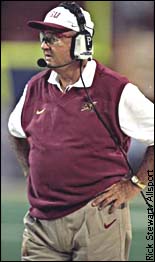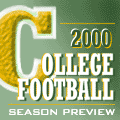| | By Gregg Doyel
Special to ESPN.com
John Swofford, coordinator of the Bowl Championship Series, is a numbers guy.
Hey, he's commissioner of the ACC, a former athletics director at North Carolina. The man gets paid to deal in numbers.
And these are the pertinent figures he sees for the BCS: 14 percent, and 100 percent.
The first number represents the frequency of the old bowl system for matching up the top two teams in a true national championship game -- roughly once every seven years.
The second number is the frequency No. 1 has played No. 2 since the BCS came about in 1998.
"We're two for two, and this is a system that has a good chance of putting No. 1 vs. No. 2 every year," Swofford says. "The BCS has worked."
It only began working when the Rose Bowl finally yielded after the 1997 season, joining the Orange, Sugar and Fiesta bowls in an association that pairs the top two teams based on a convoluted formula that takes into account strength of schedule, both major polls and multiple computer ratings. The BCS is the evolution of the 1992 Bowl Coalition, which became the Bowl Alliance in 1995.
In the debut year of the BCS, Tennessee won the 1998 national championship over Florida State in the Fiesta Bowl. Last season, Florida State beat Virginia Tech in the Sugar Bowl. This season, the BCS title game is Jan. 3 at the Orange Bowl.
|  | | Bobby Bowden likes the BCS. Of course, FSU has played in both BCS championship games. |
Florida State coach Bobby Bowden, for one, likes the BCS. As well he should.
"We've made it there both years, so it's been good for us," Bowden says. "I'm not sure everyone likes it, but we've got no complaints. It really has set up one versus two."
It also has turned the January bowls, once a fiesta for football fans, into an all-or-nothing proposition. The national championship game is all -- the rest are nothing.
"One game matters," says Georgia Tech's George O'Leary. "The others are window dressing."
Last year's championship game had a TV rating of 17.5, almost 24 percent higher than the next most-watched bowl, the Rose (14.1).
The BCS formula has its peculiarities, too. Last year, Virginia Tech's unlikely run to the national title game could have been ruined by once-beaten Nebraska had the Cornhuskers blown away Colorado in their regular-season finale. Alas, Nebraska won by just three and Virginia Tech's BCS spot was secure.
Two years ago, Kansas State ran roughshod over its regular-season competition, beating seven by at least 41 points. Then came the Big 12 championship game, where the 11-0 Wildcats lost in double overtime to Texas A&M -- costing Kansas State not only the national championship game, but a spot in any other BCS bowl (average payout: $12 million).
The deflated Wildcats went to the Alamo Bowl -- payout: roughly $1 million -- where they lost to Purdue. As you might guess, Kansas State coach Bill Snyder isn't pleased with the BCS.
"It really is a mystery to me," he says. "I don't understand it and I haven't taken time to understand it, and those people who have made an effort to understand it tell me they don't understand it either. But we do understand we're not going to have any impact on how that all plays out."
Understand this: Scheduling matters. Although it couldn't capitalize, 10-1 Nebraska was in position to squeeze past 11-0 Virginia Tech last season because its schedule was considerably tougher.
Kansas State, meanwhile, slid completely out of the 1998 BCS because the computers involved cared more about whom the Wildcats were beating than how badly. Kansas State won its non-conference games that season by scores of 66-0 (against Indiana State), 62-7 (Northeast Louisiana) and 73-7 (Northern Illinois).
Snyder, however, remains an unrepentant scheduler. This season the Wildcats play Louisiana Tech, Ball State and North Texas, who combined for a 14-19 record last year. Future non-conference opponents include Southwest Louisiana, Utah State and Arkansas State -- and that's just in 2002.
"We schedule the way I feel is in the best interest of our football team," Snyder says. "I was laboring under the assumption that, supposedly, as the schedule got tougher, you would gain some leverage (with the BCS), but that doesn't seem to be the case. Still, I believe (the Big 12) to be the toughest eight-game schedule any team could have."
Maybe so. But it hasn't done a lot for Kansas State's BCS aspirations. Kansas State ended the 1999 regular season ranked seventh and with a 10-1 record -- and again got bypassed by the BCS.
While the BCS did its job, pitting Florida State against Virginia Tech in the game everyone wanted to see, the Wildcats went to the Holiday Bowl.
Merry Christmas.
Gregg Doyel covers the ACC for The Charlotte Observer
| |
ALSO SEE
BCS 101: Understanding how it works
ESPN experts: Debating the BCS
|


